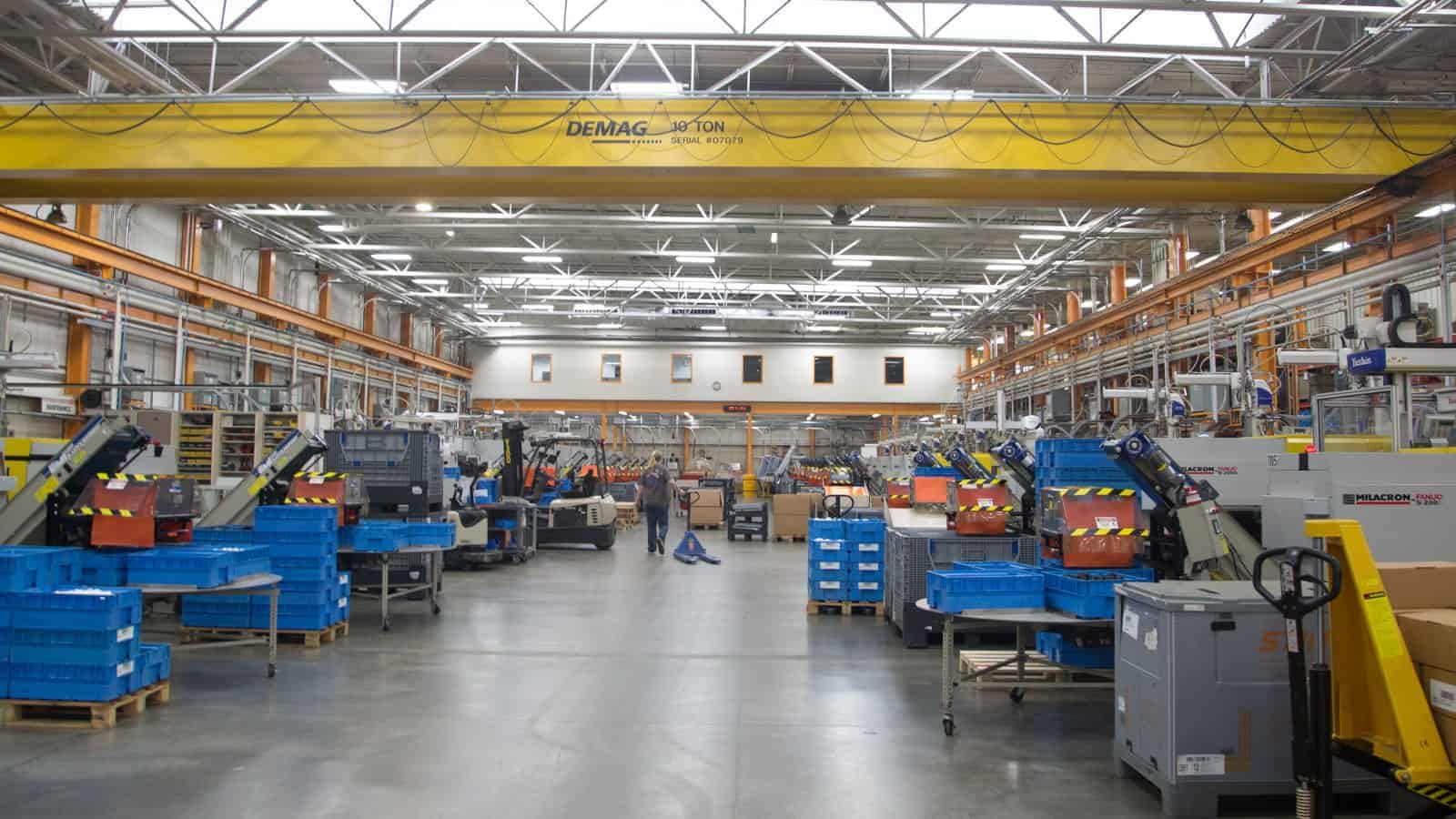Manufacturers Sue SEC to Protect Private Businesses, Release Data on Harmful Impact of Novel Rule Interpretation
Washington, D.C. – The National Association of Manufacturers and the Kentucky Association of Manufacturers filed a lawsuit in federal court today challenging the Securities and Exchange Commission’s attempt to impose unwarranted public disclosure requirements on privately held businesses.
The SEC has adopted a novel reinterpretation of SEC Rule 15c2-11, imposing the rule’s public disclosure requirements on private companies that raise capital via corporate bond issuances under SEC Rule 144A—without giving manufacturers the opportunity to provide comment on the damaging impacts of such a consequential change.
According to EY economic analysis released by the NAM today, the SEC’s expansion of Rule 15c2-11 will result in decreased liquidity and increased borrowing costs in the manufacturing industry and throughout the economy—leading to job losses exceeding 100,000 annually.
“The SEC’s attempt to force private companies to disclose confidential financial information publicly is a clear violation of the Administrative Procedure Act,” said NAM Chief Legal Officer Linda Kelly. “The SEC never allowed public comment on its novel reinterpretation of Rule 15c2-11, there is no conceivable benefit to the new standard, and the SEC did not consider the impact that its about-face will have on privately held businesses—which could exceed 100,000 lost jobs each year. The NAM Legal Center is filing suit to hold the SEC accountable and protect manufacturing growth, job creation and U.S. competitiveness.”
“The SEC’s unlawful overreach threatens privately held manufacturers in Kentucky and across the country, so the Kentucky Association of Manufacturers is proud to join the NAM in this important litigation on behalf of all manufacturers in the U.S. to counter the SEC’s regulatory onslaught,” said KAM President and CEO Frank Jemley.
EY analysis highlights the damaging economic impacts of the SEC’s actions:
The economic impacts of the SEC’s expansion of Rule 15c2-11 will be felt disproportionately in the manufacturing industry, which accounts for more than half of all nonfinancial issuers of corporate bonds under Rule 144A. Across the economy, the change will result in 30,000 jobs lost each year over the first five years the new interpretation is in effect. The job losses will increase over time—rising to 50,000 jobs lost each year after five years and 100,000 jobs lost each year after 10 years.

These job losses are attributable directly to the decreased liquidity and increased borrowing costs associated with the SEC’s new interpretation.
Background:
- SEC Rule 15c2-11 requires broker-dealers to ensure that key information about companies issuing over-the-counter equity securities is current and publicly available prior to quoting those issuers’ securities.
- SEC Rule 144A allows for resales of securities (primarily corporate debt issuances) to qualified institutional buyers—large financial institutions that own or manage more than $100 million in securities. Retail investors cannot purchase Rule 144A securities. Notably, under Rule 144A, issuers are obligated to make their financial and operational information available to QIBs.
- In September 2021, the SEC’s Division of Trading and Markets issued a no-action letter applying Rule 15c2-11 to Rule 144A debt. This decision contradicted the historical application of Rule 15c2-11 to OTC equity securities and bypassed important rulemaking safeguards required by the Administrative Procedure Act.
- The NAM and the KAM filed petitions for rulemaking with the SEC in November 2022 seeking both permanent and temporary relief from the application of Rule 15c2-11 to Rule 144A securities. Following the petitions, the SEC temporarily delayed enforcement of its novel reinterpretation until January 2025, but the agency has not acted to reverse this damaging decision permanently.
-NAM-
The National Association of Manufacturers is the largest manufacturing association in the United States, representing small and large manufacturers in every industrial sector and in all 50 states. Manufacturing employs nearly 13 million men and women, contributes $2.90 trillion to the U.S. economy annually and accounts for 55% of private-sector research and development. The NAM is the powerful voice of the manufacturing community and the leading advocate for a policy agenda that helps manufacturers compete in the global economy and create jobs across the United States. For more information about the NAM or to follow us on Twitter and Facebook, please visit www.nam.org.
ANWR Lease Holder Will Fight Cancelation

The owner of seven oil-and-gas leases that were recently canceled by the Biden administration is readying for a legal fight, according to POLITICO’s ENERGYWIRE (subscription).
What’s going on: The Alaska Industrial Development and Export Authority—which bought the leases from the federal government in 2021—“has vowed to pursue legal action against the federal government for the cancellation of the leases spanning 365,000 acres in the coastal plain of the Arctic National Wildlife Refuge.”
- Last week, the Interior Department announced that it would nullify the leases “based on what the administration called an inadequate National Environmental Policy Act review process.”
- “A willingness to circumvent laws passed by Congress has consequences reaching far beyond ANWR’s boundaries, and will impact future development across this country,” the economic development organization responded in a statement.
Required by law: While canceling the leases appears to fall under Interior’s purview, the agency is obligated by the 2017 tax law to offer two lease sales in ANWR, according to former Interior Secretary David Bernhardt, ENERGYWIRE reports.
Why it’s important: ANWR is estimated to hold more than 10 billion barrels of technically recoverable oil. Drilling for it would create more than 100,000 jobs while generating hundreds of billions of dollars in new government revenue, according to data from the House Committee on Natural Resources cited in USA Today.
Our take: “The administration should be taking actions that strengthen energy security, not weaken it,” said NAM Vice President of Domestic Economic Policy Brandon Farris.
- “The cancellation of the ANWR leases based on the NEPA review process underscores our need to continue to reform our broken permitting system. The NAM continues to push Congress and the administration to develop policies that cut through red tape to develop all energy projects, including renewables, nuclear, oil and gas, hydrogen and more.”
NLRB Revives Troubling “Card Check” Process

Bringing back parts of a policy it dropped more than half a century ago, the National Labor Relations Board moved late last week to reinstate an abridged version of “card check,” according to Reuters (subscription).
What’s going on: In a “3-1 decision in a case involving building materials company Cemex Construction Materials,” the NLRB unveiled a new framework last Friday that revives the 1949 Joy Silk doctrine, which holds that “employers must bargain with unions unless they have a good-faith doubt that majority support exists.”
The background: The board had tossed out the doctrine in the early 1970s after the Supreme Court’s decision in NLRB v. Gissel Packing Co., in which the court held that “the NLRB could force employers to bargain with unions when they engage in misconduct so severe that any election would be tainted.”
- This new decision “could provide a major boost to unions by allowing them to represent workers in certain cases when a majority sign cards in support of unionizing, rather than going through the lengthy and often litigious election process.”
- Last week’s move also came a day after the board finalized a return to Obama-era regulations purportedly aimed at speeding up union elections.
Why it’s problematic: Card check—which the NAM has long opposed—is inherently unfair and insecure, and it strips employees of their right to secret ballots, said NAM Director of Infrastructure & Labor Policy Ben Siegrist.
- “The NLRB’s decision could create a glide path to force unionization on workers without the necessary safeguards of an election, and it runs counter to 50 years of precedent established by the Supreme Court,” he said. “Effectively, this action contradicts the rights all employees have in determining their own representation.”
Small Business Administration Relaxes Lending Rules

The Small Business Administration is streamlining its lending process, according to The Wall Street Journal (subscription).
What’s going on: “The Small Business Administration is simplifying loan requirements, automating more of the process and expanding the pool of nonbank lenders licensed to issue SBA loans. The moves, many of which take effect Aug. 1, will make it easier for financial-technology firms to participate.”
- The goal: to increase credit extended to small businesses that have typically struggled to get it.
The concern: “[T]he changes—and the decision to couple relaxed requirements with new lenders—have drawn criticism from the industry and members of Congress, who say the revisions could jeopardize the program by increasing loan defaults.”
- Some worry that without “firm guardrails from the SBA” lenders will make risky loans, resulting in more defaults.
- Even if defaults don’t increase, loans could get more expensive for borrowers, as lenders will now be able to charge flat fees.
Why it’s important: “The SBA is authorized by Congress to guarantee as much as $34 billion in loans annually through its main lending program” but qualifying for the funds requires adhering to a set of burdensome rules—and that’s led to underutilization of available funds, according to the Journal.
The changes: “Under the new SBA rules, lenders can use their own standard credit policies to make SBA loans of as much as $500,000 instead of following government guidelines. Lenders are encouraged to check a box to indicate why borrowers can’t get credit elsewhere, a crucial program requirement, instead of providing a detailed written explanation.”
- Revisions to the loan requirements include reduced or eliminated downpayments for some borrowers.
DOE Loosens Gas Stoves Rule

The Department of Energy is loosening proposed energy-efficiency regulations for gas cooktops after reviewing data submitted by one of the NAM’s trade association partners and a utility company, POLITICO (subscription) reports.
What’s going on: “In a notice of data availability to be published in Wednesday’s Federal Register, DOE floated less stringent efficiency requirements for gas stoves. The initial proposal called for a consumption limit of 1,204 … British thermal units, or kBtu, per year, down from the baseline estimate of 1,775 kBtu per year. But the new proposal raises those figures slightly. Now DOE is proposing a limit of 1,343 kBtu per year, down from a recalculated baseline of 1,900 kBtu per year.”
- The Association of Home Appliance Manufacturers and PG&E provided the DOE with data on cooktops with higher consumption rates, which the agency had not used in its initial efficiency testing.
- “Other comments led DOE ‘to better understand’ what features consumers want in a gas stove, including multiple high input rate burners and continuous cast-iron grates,” POLITICO reports.
Why it’s important: Manufacturers would be required to spend more than $2.5 billion to comply with the originally proposed rules, according to the DOE’s own estimates. However, consumers would save just 12.5 cents a month in energy costs.
- The mandates would have been so strict as to make 96% of gas stoves on the market noncompliant.
What Congress has done: In June the House passed the Save Our Gas Stoves Act, which would prevent the DOE from advancing its unworkable stove requirements.
What we’re doing: The NAM has held high-level discussions with policymakers on the importance of feasibility, affordability and consumer choice in rulemaking.
- To that end, in June the NAM and members of the NAM’s Council of Manufacturing Associations and Conference of State Manufacturers Associations created the Manufacturers for Sensible Regulations, which aims to combat the recent regulatory onslaught by federal agencies.
The NAM says: “Manufacturers depend on regulatory clarity and certainty,” said NAM Managing Vice President of Policy Chris Netram.
- Throughout the year, the Department of Energy has proposed an unprecedented slew of regulations, and many were aimed at home appliances. The DOE is now taking steps toward a solution that is less likely to raise production costs significantly for manufacturers, and less likely to reduce the available features, performance and affordability for consumers.”
Michigan Homebuilders Push Back on Air Quality Proposal

“Policy can’t be developed in a vacuum,” says Dawn Crandall, executive vice president of government relations for the Home Builders Association of Michigan. “People need to look at how one policy impacts that next thing. Everything is tied together.”
That’s Crandall’s message for the Environmental Protection Agency, as it considers a proposed air quality rule to restrict particles called PM2.5. While the regulations might not appear to impact the housing industry directly, they could prevent manufacturers from expanding facilities and creating jobs in Michigan—which does affect the housing market.
The concern: If manufacturers are unable to grow in the state or open new facilities, fewer people will need housing. That’s bad news for homebuilders.
- “If you put in these EPA regulations that are going to create a barrier for companies looking to move here, and then they decide they don’t want to, that’s going to impact Michigan’s ability to be an economic destination,” said Crandall.
- “And if you make it harder for businesses to employ employees, then they don’t need housing. That has a big impact on us.”
A shaky foundation: Michigan’s housing industry is still recovering from the significant downturn it experienced about 15 years ago.
- That slump was dramatic: according to Crandall, the number of permits filed in Michigan for single-family homes fell sharply from 54,721 in 2005 to around 15,000 two years later, bottoming out to about 6,900 in 2009.
- Although the industry has seen some recovery since then, new construction remains relatively low, and Crandall worries that shocks caused by the EPA’s proposed regulations could do further harm.
- “I think we’ve hit rock bottom, and we’re slowly coming out of it,” said Crandall. “But we’re only projecting 16,000 single-family permit builds this year—and anything that’s going to impact residential construction is not good for the state of Michigan.”
Another challenge: Ultimately, Crandall is concerned that the EPA’s proposed rule will simply add to a long list of challenges for homebuilders.
- “We’re already facing enough hurdles,” said Crandall. “There’s a lack of skilled workers who can do residential construction. Material costs peaked during COVID. We get a lot of our lumber from Canada, so these Canadian wildfires could have an impact. So if PM2.5 is going to affect economic development in our state, that’s going to have an impact on us, too.”
The big idea: “We’re all connected in some form or fashion,” said Crandall. “Michigan needs to grow our population, and we can’t do that if companies don’t bring people into our state who want to live, work and play here. We’re one big ecosystem.”
Illinois Chemical Industry Warns Against New EPA Standard

The chemical industry has a wide reach. According to Mark Biel, CEO of the Chemical Industry Council of Illinois, 96% of products made in the United States are either manufactured by the chemical industry itself or using materials it produces.
- “We make everything from cell phones to packaging,” said Biel. “People don’t realize the integral role that chemistry plays in their lives.”
And for Illinois in particular, the chemical industry isn’t just making products—it’s making careers.
- “Our state has 46,000 people in the chemical industry, and the average wage is a little over $114,000,” said Biel. “We are the second largest manufacturing sector in Illinois, which is the fourth largest chemical processing state. Folks don’t realize how large and important the chemical industry is to Illinois.”
But as the Environmental Protection Agency considers imposing a new, stricter air quality standard for particles called PM2.5, chemical manufacturers in Illinois are sounding the alarm. According to Biel, the new regulations misunderstand the situation—and threaten to cause irreparable harm for manufacturers across the state.
The background: Manufacturers have long been committed to reducing particulates in the air, including PM2.5, and have made huge strides over the past half-century. But to further reduce PM2.5 will be a tall order.
- “We should be focused on enforcing the regulations we already have in the books,” said Biel. “The U.S. already has strong regulations in place—ones that many areas are still working to meet. Let us be smart about new regulations, which means we should not change air permitting before meeting current standards.”
The local angle: For the chemical industry in Illinois, the changes could be particularly damaging.
- With access to waterways, relatively inexpensive electricity and extensive natural gas pipeline infrastructure, the St. Louis and Chicagoland areas of Illinois are hubs for the national chemical industry.
- However, if the EPA’s standards become stricter, it could deter investments to these metro areas significantly.
- “It’s difficult enough to permit a new facility in the Chicagoland area, and when you throw on additional burdens, it makes it harder and harder to justify making the investment in these facilities,” said Biel.
The global stage: Especially at a time when many manufacturers are looking for ways to bring investments and supply chains back to the United States, this kind of onerous regulation could create a stumbling block.
- “Our lawmakers want manufacturing to come back to the U.S., but this regulation does the exact opposite,” said Biel. “With all the new investment, it’s important that more and more manufacturers locate in the U.S. to avoid supply chain complications and delays. This regulation hinders that development.”
The last word: “I’m bullish on the long-term prospects for our industry, but sometimes the EPA loses sight of the reality that their regulations are already sufficient,” said Biel. “The current PM2.5 standard has worked. But this proposal goes far beyond that and will hinder a crucial opportunity for the industry to grow in the U.S.”
Incandescent-Bulb Rules to Be Fully Enforced

Following years of regulatory disputes, the incandescent lightbulb will be almost completely phased out starting this month, according to E&E News’ ENERGYWIRE (subscription).
What’s going on: “Along with prohibiting the manufacture, import and retail sales of most incandescent bulbs, [Department of Energy] rules finalized last year authorize DOE to slap penalties of $542 on companies per each violation. That could mean millions of dollars in fines for large incandescent orders.”
- DOE says the move will cut greenhouse gas emissions and lower consumers’ utility bills.
- While there is not an explicit ban on incandescent bulbs, most of them are unable to meet the efficiency requirements that were set by Congress in 2007 and will now go into full enforcement.
What it could mean: “Industry representatives say the sweep of regulations on various appliances will spike upfront costs for consumers in the market for appliances,” ENERGYWIRE reports. “Republican lawmakers on Capitol Hill argue the Biden administration is waging a back-door campaign to ban gas stoves and other appliances.”
Treasury to Revisit Foreign Tax Credit Changes

The U.S. Treasury is considering possible modifications to heavily criticized changes it made to foreign tax credit rules last year, POLITICO Pro (subscription) reports. While it does so, businesses can rely temporarily on the old rules.
The background: The U.S. tax code has long provided a foreign tax credit, which is intended to prevent double taxation for U.S. businesses that have foreign income subject to both U.S. and foreign income tax.
- The new rules were “finalized last year in response to the rise of digital service taxes in other countries. Businesses say the rules have gone too far.”
What’s going on: When the changes were made final, “the Treasury Department and the IRS received questions regarding the application of the … final regulations and requests to modify those regulations,” reads a notice from the IRS.
- While Treasury revisits the changes, businesses can use the old regulations for taxable years beginning on or after Dec. 28, 2021, and ending on or before Dec. 31, 2023.
- “[A]dditional temporary relief” may also be provided, according to the notice.
Why it’s important: In 2021, when the agency was considering the changes to the foreign tax credit regime, the NAM weighed in, warning that “proposals to limit the foreign tax credit should take into consideration the potential impact on the ability of manufacturers to effectively compete in a global market.”
- When Treasury ultimately released the final regulations, the NAM and a coalition of business groups called on it to withdraw and repropose the regulations, saying the rules would limit significantly the ability of manufacturers to claim the foreign tax credit.
Our take: “The NAM welcomes the decision by Treasury and the IRS to revisit the harmful changes made to the foreign tax credit rules, which tilted the playing field against globally engaged manufacturers,” said NAM Senior Director of Tax Policy David Eiselsberg.
- “Throughout the process, the NAM made it clear that any changes should not hurt the ability of manufacturers to effectively compete in today’s global economy.”
Stricter Water Heater Standards Would Cost Manufacturers

The Department of Energy released a draft proposal late last week that would impose stricter efficiency standards on water heaters—and increase costs for manufacturers, E&E News’ ENERGYWIRE (subscription) and The Washington Examiner report.
What’s going on: On Friday night, the DOE released a 425-page plan “to mandate energy efficiency levels for new consumer water heaters, which the department defines as appliances in homes and small businesses that use ‘oil, gas or electricity to heat potable water for use outside the heater upon demand,’” according to ENERGYWIRE.
- The Biden administration says the move—which would go into effect in 2029 if approved in its current iteration—would cut carbon dioxide emissions and reduce energy use by residential water heaters, saving consumers money.
- The draft rule arrives just months after the DOE released a proposal to phase out approximately half of the gas-powered stoves on the market. The House recently approved two measures to stop “gas stove rulemaking from DOE and the Consumer Product Safety Commission,” according to ENERGYWIRE.
What it would mean: The water heater rule would force manufacturers to use heat pump technology to produce electric water heaters and condensing technology to make gas-fired water heaters—and it would spike production costs in the process, according to the Examiner.
- “The [DOE] draft outlines the potential effect on manufacturers, estimating the implementation of the updated standards could result in ‘a loss of $207.3 million to a gain of $165.5 million’ through the year 2056. The DOE estimates conversion costs would be $228.1 million,” the Examiner reports.
The NAM says: “These proposed regulations add costs to manufacturers and consumers and remove market options,” said NAM Vice President of Domestic Economic Policy Brandon Farris.
- “Manufacturers believe that regulations should allow manufacturers in America to compete in a global market—while protecting consumers. The targets proposed by the DOE fail to accomplish that goal.”
